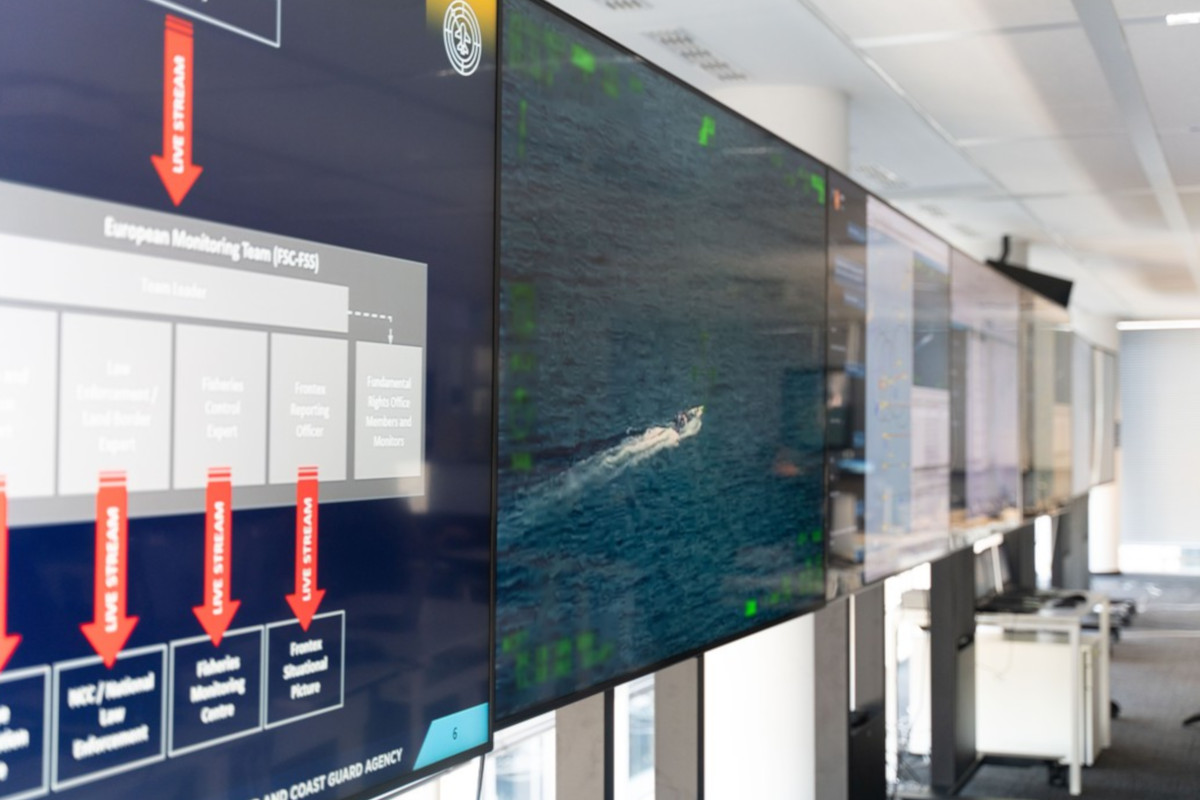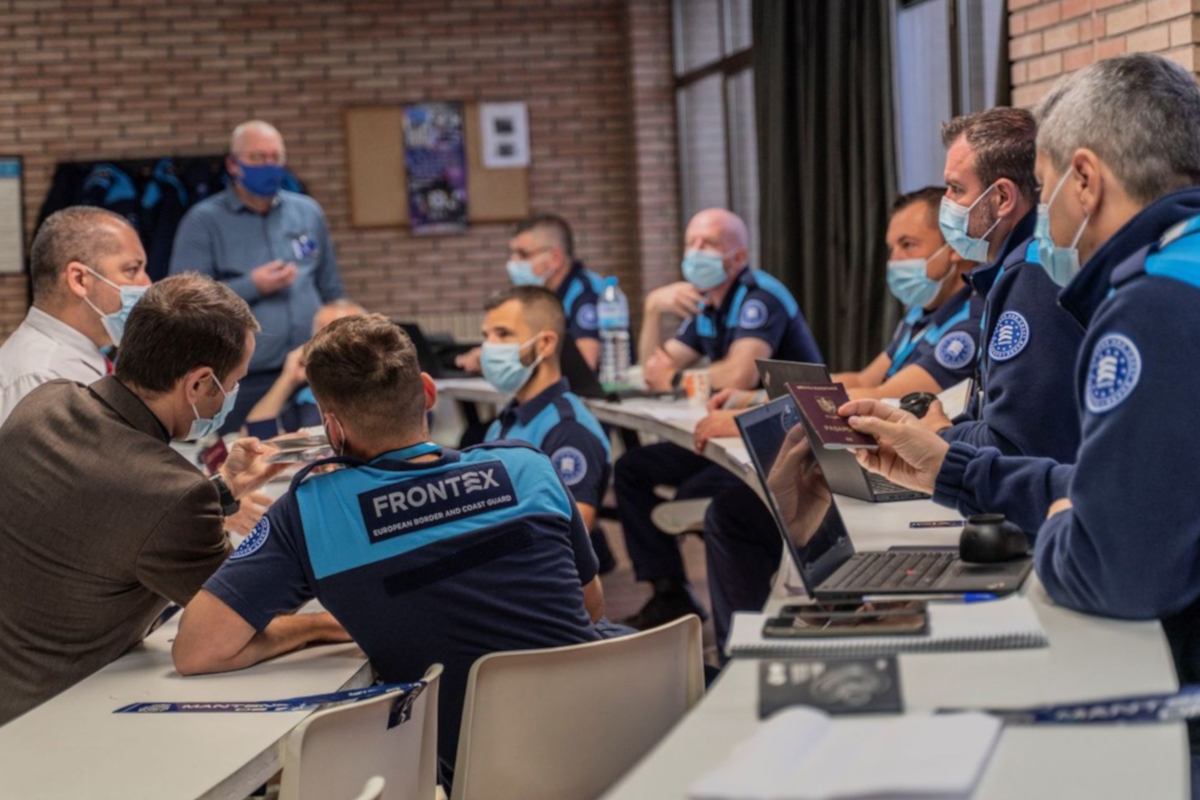Greek border deaths: Frontex management board knew about "systematic" violations
Topic
Country/Region
20 June 2024
An investigation by the BBC has put the Greek state’s deadly border policies back in the public eye – but there has so far been no mention in the press of Frontex’s operations in the country. Documents seen by Statewatch show that despite warnings from its own fundamental rights officials, Frontex’s senior staff and management board did nothing to halt the agency’s operations in Greece. Suspending or terminating operations is a legal obligation when rights violations “are of a serious nature or are likely to persist.” A case before the Court of Justice of the EU is seeking an order to halt Frontex’s Greek operations, with an appeal filed in January still pending.
Support our work: become a Friend of Statewatch from as little as £1/€1 per month.

Image: Frontex
“Obviously illegal”
“The Greek coastguard has caused the deaths of dozens of migrants in the Mediterranean over a three-year period, witnesses say, including nine who were deliberately thrown into the water.”
This is one key finding of a new BBC investigation, with the broadcaster reporting that more than 40 people are “alleged to have died as a result of being forced out of Greek territorial waters, or taken back out to sea after reaching Greek islands.”
This is far from being a new topic. Migreurop’s 2010 annual report referred to the ongoing use of pushbacks by Greek authorities, and a 2013 report by Amnesty International highlighted how “people's lives are frequently put at risk by the actions of the Greek border guard and coastguard while carrying out push-back operations along the border with Turkey.” A 2014 report also covered the topic; the authors interviewed a Sudanese man who had arrived in Greece in 2006 who said “on several occasions he had been returned to Turkey from Greece outside of any legal procedure.”
A former Greek coast guard official interviewed by the BBC said the quiet part out loud when – off camera but still on mic, and speaking in Greek rather than in English – he described the actions of his former colleagues as “obviously illegal” and “an international crime.”
This will lead some to ask whether Frontex, which currently has two operations running in the country (Poseidon and Terra), might bear any responsibility for these international crimes. At the very least, questions are likely to be raised about what the agency knew and what it did in response.
Four dead by drowning
It is evident that the agency had detailed knowledge of the Greek coast guard’s “obviously illegal” activities.
“The Office considers credible and likely that 11 individuals were pushed back from Chios island to Turkish territorial waters in August 2022 and left at sea by the Hellenic Coast Guard which resulted in the drowning of 3 migrants.”
“The Office considered credible and plausible that 7 individuals were pushed back from Samos to Turkish territorial waters in September 2022 and abandoned at sea by the Hellenic Coast Guard which led to the death of one of them.”
“…the Office considers credible the allegations according to which over 70 migrants were forced into four life rafts, including a damaged one, and abandoned at sea by a Hellenic Coast Guard vessel.”
“…a migrant arrived with his family as part of a group of 22 to the north of Lesvos, where 17 members of this group were collected by four masked armed men, loaded in a van and driven to the beach in the south of Lesvos. From here, they were pushed back by boat to Türkiye and left adrift in a life raft, in what the Office assesses as a coordinated operation involving Greek officials and unknown individuals acting in concert with them.”
These are some of the findings of Frontex’s Fundamental Rights Officer (FRO) on serious incident files that were closed during the period between February and July last year. They are contained in two reports submitted by the FRO to the agency’s Management Board, and seen by Statewatch.
“Systematic” collective expulsions
In the BBC documentary, Jonas Grimheden, Frontex’s Fundamental Rights Officer, is asked whether he believes that a collective expulsion on a Greek coast guard vessel co-funded by Frontex, captured on film, was a one-off incident or part of a widespread policy.
“I don’t want to go into that because that would undermine the credibility that I have and the leverage that I seek to have with the national authorities,” Grimheden says in response.
His report to the Frontex Management Board covering the period from May to July last year deals with the topic in a more straightforward manner.
“The Office found that cases of collective expulsion (with other associated fundamental rights violations) were coordinated, well-resourced, and seemingly conducted systematically, rather than isolated incidents.”
This morning, Grimheden announced he was standing to be the next European Ombudsman, whose role is to investigate maladministration in EU institutions, bodies and agencies.
As well as reporting on closed cases, the FRO reports also detail how many new Serious Incident Reports (SIRs) were opened. Between February and April, 13 new SIRs were filed, five of which concerned Greece; between May and July, 15 were filed, with seven concerning Greece.
In four of the first five cases, Frontex officials were alleged to be witnesses to or have knowledge of the event, and in one to be involved in “direct harm,” defined as “Frontex officers directly [causing] the fundamental rights violation through their actions or failure to act.” In five of the latter seven cases, the report says that Frontex officials were witnesses to or had knowledge of the event.
No suspension of operations
Frontex’s Executive Director and Management Board are well aware of the situation in Greece; last year, there were even discussions on whether the Executive Director should invoke Article 46 of the Frontex Regulation and suspend the agency’s operations in Greece.
The proposal came from Jonas Grimheden himself, with the media reporting that it was raised in response to the Pylos shipwreck, in which more than 600 people died.
The proposal is also mentioned in one of the reports reviewed by Statewatch, which tells a rather different story. Referring to the “coordinated, well-resourced,” and “seemingly” systematic collective expulsions carried out by Greek authorities, it says:
“Considering that in substance nothing appeared to have changed in the practices of the Greek authorities, in June 2023 Frontex’ Fundamental Rights Officer advised the Agency’s Executive Director to apply Article 46 of the EBCG Regulation.”
The suspension or termination of operations in accordance with Article 46 is reliant on the Executive Director considering that “violations of fundamental rights or international protection obligations related to the activity concerned… are of a serious nature or are likely to persist.”
In the end, nothing came of the proposal, and the FRO report itself immediately backtracks:
“To be noted, though, that, following this Opinion and towards the end of the reporting period, the Fundamental Rights Officer has identified indications of changing practices. The Fundamental Rights Officer will monitor and report further on possible positive developments in the next MB [Management Board] report.”
Hans Leitjens, Frontex’s Executive Director, was evidently not keen on the idea of invoking Article 46, telling the European Parliament’s civil liberties committee in June last year that suspending the agency’s operations in Greece “affects our capability to save lives” and “needs to be balanced.”
However, the FRO reports suggest that Frontex’s presence in the country is doing little to contribute to saving lives due to decisions by Greek authorities to only deploy the agency’s officials in areas where there are few, if any, border crossings.
A “recurring observation” included in the February to April report notes a:
“Limited involvement of Frontex in the detection and apprehension of migrants during operations both at sea and land… particularly in the areas most affected by migratory pressure, including in search and rescue operations, remains a concern.”
The issue appears again in the subsequent report, covering April to July 2023:
“Lack of effective use of Frontex staff and assets in land and sea patrolling in the areas most affected by migratory pressure. Frontex assets are involved in limited number of interceptions at sea. In Evros, Frontex staff continue to mainly be assigned to patrol along the fence where no incidents are reported.”
Take note, take no action
The Frontex Management Board, which meets quarterly, receives the FRO reports, but the minutes of those meetings do not suggest any substantive action has been taken in response.
The minutes of the June meeting (pdf) state that the Management Board “took note of the report from the FRO on key fundamental rights concerns, including SIRs overview, key opinions and recommendations for the period 1 February 2023 – 30 April 2023.”
At the September meeting (pdf), the FRO presented the report covering the May to July period, as well as “the state of play of the evaluation of the SIR mechanism, explained the different categories of SIRs, how the follow-up to a SIR works.”
The September minutes go on to say that the agency’s Executive Board – made up of representatives of four member states, the European Commission and the Executive Director – “would develop a proposal of MB recommendations that would clearly indicate a timeframe in which a [member state] is required to respond to questions during a SIR investigation.”
The same document also refers to a discussion on the Greek “implementation plan,” and says that the Management Board “called on Greece to continue its efforts and welcomed that the gap between how EL [Greece] and other actors perceive the progress of the fulfilment of the Greek implementation plan is closing.”
In response to an inquiry from Statewatch, a Frontex spokesperson refused to comment on the content of the FRO reports, but said:
"The Frontex Fundamental Rights Office investigated several alleged incidents in 2022 in serious incident reports and issued a number of recommendations to the Greek authorities. The Greek authorities denied the allegations and expressed a commitment to further investigate them. Frontex does not have the power to investigate such allegations. It is the responsibility of member states like Greece to investigate any allegations of wrongdoing."
They went on to say that halting operations in Greece is "a last-resort measure we don't take lightly. Such a step would impact not just our joint efforts to secure the EU's borders but also our ability to save lives."
Frontex in court
With Frontex having taken the decision that its operations in Greece should continue, independent organisations have sought other means to halt the agency’s activities.
The organisation Front-Lex has brought numerous cases to the Court of Justice of the EU (CJEU) seeking the termination of Frontex’s Greek operations, on the grounds that they are responsible for fundamental rights violations.
Last November, the General Court dismissed a case brought by Front-Lex (ST v Frontex) on behalf of “a Congolese national residing in Türkiye, who fled his country owing to ill-treatment inflicted by his uncle and who wishes to obtain asylum in Greece in order to find safety and pursue his studies there.” The application sought to have Frontex suspend or terminate its activities in the Aegean in accordance with Article 46 of the Frontex Regulation.
The judges ruled that the case was inadmissible, arguing that “it is not certain that the applicant could derive any advantage from the annulment of the contested decision,” because that advantage is “conditional on the existence, on the date of its adoption, of violations of fundamental rights or international protection obligations related to the activity concerned that are of a serious nature or are likely to persist.”
The FRO reports demonstrate that Frontex had clear knowledge of persistent, serious violations of fundamental rights in Greece, but it has not taken any steps under Article 46 in response.
Front-Lex filed an appeal in January, but there has so far been no action from the court.
Monitoring mechanisms
Meanwhile, in Brussels, national delegations have started discussing the “independent fundamental rights monitoring mechanism” that member states have to introduce in accordance with the new Screening Regulation.
A note circulated by the Belgian Council Presidency in May (pdf) summarises member state obligations with regard to the mechanism, noting that they “must guarantee its independence, provide adequate financial resources and ensure it has unhindered access to all relevant locations and documents.”
A recurring feature of the Frontex FRO reports seen by Statewatch is the utter lack of independent investigations in Greece into rights violations.
In the May-July 2023 report, a recommendation to the Greek authorities labelled as “old” calls for the country “to provide genuine accountability for all fundamental rights violations in the operational area. To conduct effective and impartial investigations into allegations of ill-treatment and irregular returns of migrants.”
The Presidency note asks delegations a number of questions about their plans, including: “How do you plan to equip the mechanism with the necessary powers, expertise and resources to effectively monitor compliance with fundamental rights?”
The response of the Greek state remains to be seen.
Documentation
- Implementation of the Screening regulation: Setting up an independent national fundamental rights monitoring mechanism (Council doc. 10352/24, LIMITE, 24 May 2024, pdf)
- 37th Fundamental Rights Officer report to the Management Board, Reporting period: 1 February 2023-30 April 2023, Ares(2023)3871350, 5 June 2023
- 38th Fundamental Rights Officer report to the Management Board, Reporting period: 1 May-31 July 2023, Ares(2023)6028751, 5 September 2023
Our work is only possible with your support.
Become a Friend of Statewatch from as little as £1/€1 per month.
Further reading

Frontex: deportations at record high in first half of 2023
The European Union's border agency, Frontex, facilitated the deportation of nearly 18,000 individuals from EU territory during the first half of 2023, marking an unprecedented peak. This surge in removals, executed through both scheduled flights and "voluntary" return procedures, demonstrates a 60% upswing in deportations compared to the corresponding period in 2022.

European Commission wants common rules on "registration and certification" for Mediterranean search and rescue organisations
A "Draft Roadmap towards a 'European Framework for Operational Cooperation on Search and Rescue in the Mediterranean Sea'," obtained by Statewatch and published here, indicates that the European Commission is aiming for "standardisation/convergence of registration and certification rules on private vessels carrying out SAR [search and rescue] as their predominant activity." This could be used to hinder the activities of search and rescue organisations.

Frontex to spend hundreds of millions of euros on surveillance and deportations
Frontex will spend hundreds of millions of euros on border surveillance and contracts for deportation flights this year, as well as €3 million on storing weapons and ammunition, according to a plan approved by the agency’s management board in mid-February.
Spotted an error? If you've spotted a problem with this page, just click once to let us know.
